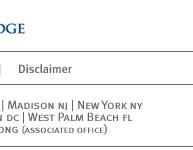
Devenish v Sanofi-Aventis: A Fatal Blow to US-Style Class Actions in the UK?
The recent failure by a group of claimants in an attempt to bring a multi-party action for an account of the defendant's profits in the UK has been seen by some as a potentially fatal blow to those championing the cause for US-style class actions in the UK. This article examines whether the Devenish Nutrition decision does indeed sound the final bell for a US brand of multi-party claim in the UK.
The Facts: Devenish Nutrition v Sanofi-Aventis1
The Claimants first brought their case in 2004 against a host of vitamin companies who had recently been the subject of substantial fines after being found guilty of price-fixing. The Claimants constituted a number of entities from the poultry and animal feeds sector who claimed that the price-fixing had unfairly inflated the price they were paying for vitamins.
The lead Claimant, Devenish Nutrition (Devenish), a supplier of pig and poultry feed out of Belfast, was seeking a share of the vitamin companies' profits, even though it had not proved whether it had suffered any actual loss itself. Devenish sought damages for breach of statutory duty or a restitutionary award, such award being in a sum equal to the overcharge or amount of the Defendants' ill-gotten net profit. The Court determined as a preliminary issue that Devenish was not entitled to an account of profits. Devenish therefore appealed to the Court of Appeal which considered, amongst other things, whether Devenish was entitled to compensatory or restitutionary damages (being an account of profits). Devenish argued that an example should be made of the Defendants that would act as a deterrent to others who might consider participating in actions that would amount to price-fixing, and that damages above what would merely be compensatory to Devenish and the other Claimants should be awarded ie a proportion of the Defendants' profits.
The only argument that had any real force with the Court of Appeal was a public policy decision, in that these cartels are a "notorious evil" and the civil courts should provide some mechanism to incentivise the eradication of this practice. Ultimately, the judges felt they could not award damages where compensatory damages would suffice or where no loss could be proven by the Claimants, even though the Defendants had acted illegally.
An End to US-style Class Actions in the UK?
In the US, claims of this type are common and are viewed as an essential part of keeping cartels in check. At present, there is no UK equivalent to the US 'class action', although there are forms of collective actions and group complaints. The main problem in the UK in trying to progress group claims is procuring funding. However, over the last few years there have been calls for the UK to open its doors to such claims, based on the argument that the unavailability of the US type of group action prevents access to justice for deserving claimants. This has led to an influx of specialists in the field into London and a positioning of domestic and overseas firms with offices in London to be prepared to take advantage of this potentially lucrative new market. In addition, specialist funds that are prepared to bankroll litigation have emerged with the stated aim of pursuing claims vested in companies or individuals and then sharing the proceeds (known as 'third party funding').
Comment
Even though this decision is evidently a major blow for those lobbying for class actions in the UK, it is not necessarily the death knell of US-style group litigation here. First, this case may be taken to the House of Lords, where there may be more of an inclination to make a policy decision that changes the litigation climate in the UK to move towards a US system. Secondly, the Government is also currently considering proposals by the Civil Justice Council on how UK group actions should be handled. Although these recommendations did not go as far as suggesting the UK should move to a position parallel to the US, their adoption would provide those seeking to run potential class claims in the UK with some means to get these actions off the ground. Thirdly, the European legal landscape has shifted in the last few years so that forms of class litigation are increasingly available to consumers, for example, Sweden, Spain, Portugal, The Netherlands and Germany also allow for some form of class litigation. It may be that the UK is ultimately forced to follow suit under a wave of pressure from the European Commission that, for example, increasingly aims to punish entities that breach EC anti-trust rules.
Although the Devenish decision appears to knock one attempt at a US-style class action down for the time being, the door of opportunity is not yet closed. There are many who have a vested interest in the growth of such claims within the UK and Europe they will continue to seek alternative avenues to ensure that the US class action seed germinates in the UK. Therefore, it is very much a case of watching this space.
1 Devenish Nutrition Limited v Sanofi-Aventis SA (France) & Others [2008] EWCA Civ 1086
Contacts
The information in this newsletter is for general guidance only and is not intended to be a substitute for specific legal advice. If you would like any further information please contact:
Henry Stewart
Associate, Commercial Litigation - London
t: +44 (0) 20 7556 4479
e: HStewart@eapdlaw.com






